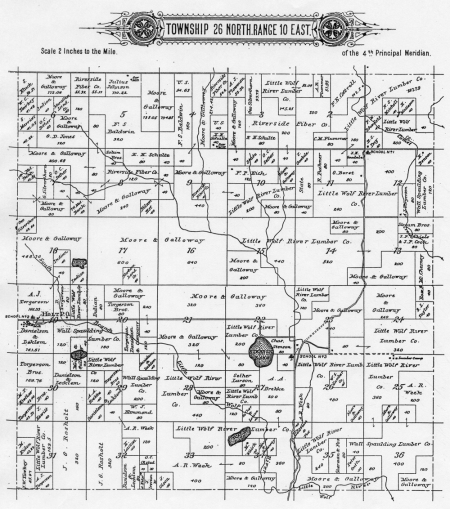Search our Places Database
Galloway, Village of
Return To List of Locations | Back to Search
For more information on this location, please contact our research library.

Author:
Mary Moltzan
Location:
T. 26 N. - R.10 E., Sec. 23, Township of Franzen
Founded:
1903
Background:
Galloway was a former wilderness logging camp known as Hunter's Camp or Spencer Camp. Adolph Torgerson, the first township chairman, platted the village of Galloway in 1903 after having figured the route that the C&NW railroad would run from Eland to Rosholt. He bought two forties along the route, hired a surveyor, platted a village and called it Galloway, after one of the owners of Moore & Galloway Lumber Company. By 1912, Galloway had three grocery stores, two feed mills, a blacksmith shop and two churches. The first settlers were loggers and lumbermen from Scandinavia, followed by Polish farmers.
See Township of Franzen
Post Office Established:
May 20, 1904
First Postmaster:
Adolph Torgerson
About The Post Office:
The P.O. was located SE 1/4, Section 22, Franzen Township. Service was discontinued on June 4, 1976 with service from Wittenburg.
Railroad:
Adolf Torgerson platted the village in 1903, the year the Chicago and Northwestern Railroad built the branch line from Eland to Rosholt. He figured the spot about halfway between Elderon and Rosholt would be a good place for a village, so he simply bought two forties across which he knew the tracks would run.
Originally built for logging, the railroad later picked up cheese and butter products from local cheese factories and creameries.
Churches:
St. Joseph's Catholic church - dedicated April, 1921.
Schools:
Galloway Grade School - closed in 1984
Business:
See Background
Industry:
Logging
Moore and Galloways' main camp, the Spencer Camp
Farming:
Dairy farms after the loggers moved out
Potato farms
Stories:
In the early days of Galloway, it was a booming log town. One Galloway native remembered as many as three long trainloads of logs leaving the town every day to fulfill the nation's need for lumber. There were so many logging camps, he said, that it would be difficult to estimate their number. They were built up and down the branch of the Little Wolf River that flows through Galloway.
He added, the loggers cut trees all through the countryside and stacked the logs up by the stream which had been dammed. Loggers would open up the dams, and the logs would go all the way to Appleton.

